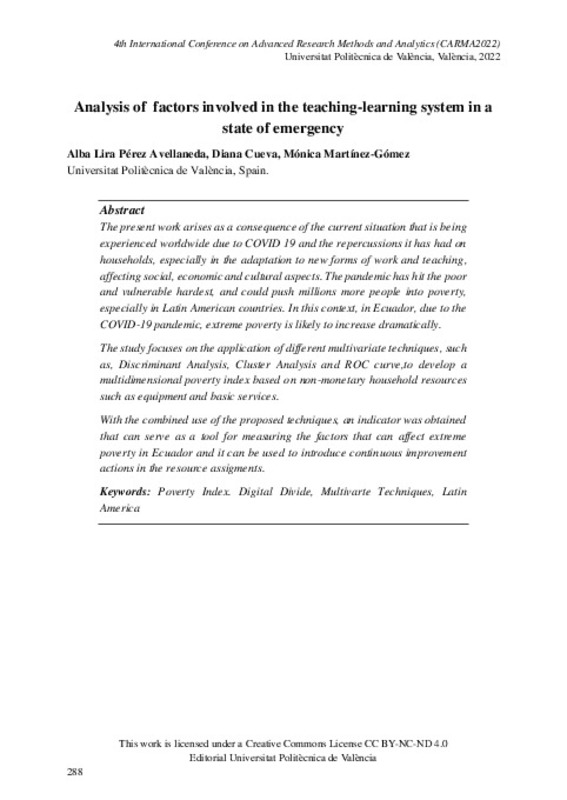JavaScript is disabled for your browser. Some features of this site may not work without it.
Buscar en RiuNet
Listar
Mi cuenta
Estadísticas
Ayuda RiuNet
Admin. UPV
Analysis of factors involved in the teaching-learning system in a state of emergency
Mostrar el registro sencillo del ítem
Ficheros en el ítem
| dc.contributor.author | Pérez Avellaneda, Alba
|
es_ES |
| dc.contributor.author | Cueva, Diana
|
es_ES |
| dc.contributor.author | Martínez-Gómez, Mónica
|
es_ES |
| dc.date.accessioned | 2022-11-14T13:18:20Z | |
| dc.date.available | 2022-11-14T13:18:20Z | |
| dc.date.issued | 2022-09-20 | |
| dc.identifier.isbn | 9788413960180 | |
| dc.identifier.uri | http://hdl.handle.net/10251/189708 | |
| dc.description.abstract | [EN] The present work arises as a consequence of the current situation that is being experienced worldwide due to COVID 19 and the repercussions it has had on households, especially in the adaptation to new forms of work and teaching, affecting social, economic and cultural aspects. The pandemic has hit the poor and vulnerable hardest, and could push millions more people into poverty, especially in Latin American countries. In this context, in Ecuador, due to the COVID-19 pandemic, extreme poverty is likely to increase dramatically. The study focuses on the application of different multivariate techniques, such as, Discriminant Analysis, Cluster Analysis and ROC curve,to develop a multidimensional poverty index based on non-monetary household resources such as equipment and basic services. With the combined use of the proposed techniques, an indicator was obtained that can serve as a tool for measuring the factors that can affect extreme poverty in Ecuador and it can be used to introduce continuous improvement actions in the resource assigments. | es_ES |
| dc.format.extent | 1 | es_ES |
| dc.language | Inglés | es_ES |
| dc.publisher | Editorial Universitat Politècnica de València | es_ES |
| dc.relation.ispartof | 4th International Conference on Advanced Research Methods and Analytics (CARMA 2022) | |
| dc.rights | Reconocimiento - No comercial - Sin obra derivada (by-nc-nd) | es_ES |
| dc.subject | Poverty Index | es_ES |
| dc.subject | Digital Divide | es_ES |
| dc.subject | Multivarte Techniques | es_ES |
| dc.subject | Latin America | es_ES |
| dc.title | Analysis of factors involved in the teaching-learning system in a state of emergency | es_ES |
| dc.type | Capítulo de libro | es_ES |
| dc.type | Comunicación en congreso | es_ES |
| dc.rights.accessRights | Abierto | es_ES |
| dc.contributor.affiliation | Universitat Politècnica de València. Facultad de Administración y Dirección de Empresas - Facultat d'Administració i Direcció d'Empreses | es_ES |
| dc.contributor.affiliation | Universitat Politècnica de València. Departamento de Estadística e Investigación Operativa Aplicadas y Calidad - Departament d'Estadística i Investigació Operativa Aplicades i Qualitat | es_ES |
| dc.contributor.affiliation | Universitat Politècnica de València. Centro de Gestión de la Calidad y del Cambio - Centre de Gestió de la Qualitat i del Canvi | es_ES |
| dc.description.bibliographicCitation | Pérez Avellaneda, A.; Cueva, D.; Martínez-Gómez, M. (2022). Analysis of factors involved in the teaching-learning system in a state of emergency. En 4th International Conference on Advanced Research Methods and Analytics (CARMA 2022). Editorial Universitat Politècnica de València. 288-288. http://hdl.handle.net/10251/189708 | es_ES |
| dc.description.accrualMethod | OCS | es_ES |
| dc.relation.conferencename | CARMA 2022 - 4th International Conference on Advanced Research Methods and Analytics | es_ES |
| dc.relation.conferencedate | Junio 29-Julio 01, 2022 | es_ES |
| dc.relation.conferenceplace | Valencia, España | |
| dc.relation.publisherversion | http://ocs.editorial.upv.es/index.php/CARMA/CARMA2022/paper/view/15075 | es_ES |
| dc.description.upvformatpinicio | 288 | es_ES |
| dc.description.upvformatpfin | 288 | es_ES |
| dc.type.version | info:eu-repo/semantics/publishedVersion | es_ES |
| dc.relation.pasarela | OCS\15075 | es_ES |






